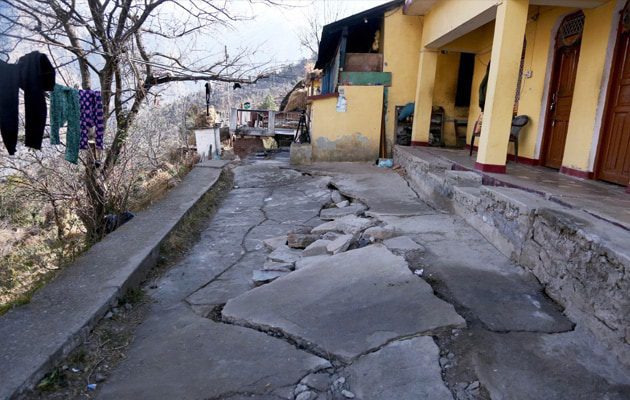
Cracks similar to those in Joshimath have appeared on the walls and ceilings of houses in more than two dozen villages of Bageshwar district in Uttarakhand’s Kumaon region, sending residents in a state of alarm.
Locals attributed land subsidence, which had aggravated with time, to large-scale soapstone mining in the area and excavated ditches being left untreated by contractors, who often violated mining norms by blasting and using heavy machinery for digging.
“Despite mining being stopped in the area two years ago, we found at least seven to eight houses in Kanda village with cracks still appearing on the walls and ceilings,” said District Mining Officer Jigyasa Bisht, who visited the village on September 3 along with a geologist and revenue officials.
Around 1,000 people had to leave their homes in Joshimath, recently renamed Jyotirmath, in early 2023 when large cracks appeared on the walls and floors due to land subsidence.
The administration’s attention was drawn to the latest threat when locals raised the issue during a janata darbar at the collectorate in Bageshwar.
However, the National Green Tribunal has not taken cognisance of any such incident in the district, Bisht said.
Cracks have also appeared in houses in more than 25 villages adjacent to the areas where mining is still going on in the district, the officer said.
These are mostly villages whose residents had given a no-objection certificate for conducting mining operations.
Of the total of 402 villages in the district, more than 100 face the threat of gradual subsidence, local resident Ghanshyam Joshi said.
Shikha Suyal, Bageshwar’s district disaster management officer, said more than 131 families in 11 villages had been identified for rehabilitation as landslides were endangering their habitation.
“More surveys of such villages are on the anvil,” she said.
Officials of the departments concerned visited the Kalika temple in Kapkot block after receiving complaints but found no violation of mining rules.
“The mines in the Kalika temple region of Kapkot were closed two years ago but the cracks are still occurring in houses,” Bisht, the mining officer, said.
Kapkot MLA and senior BJP leader Balwant Bhauriyal, who owns a soapstone mine in the Saneti region of Bageshwar, said soapstone mining in the region was done in fields given by villagers for mining.
“So the question of mining being done against their wishes does not arise. At one time, the district had 121 soapstone mines, out of which only 50 are running at present,” he said.
“Regions of Kapkot and Kanda blocks have the maximum number of mines and, due to mining activities nearby, the villages suffer from sliding and cracks in houses almost every monsoon,” said Chandra Shekhar Dwivedi, who is studying the effects of soapstone mining in Bageshwar’s villages.
“When mining norms are violated by contractors by using blasts and JCB machines (excavators), the villagers are compensated by them in various ways to placate them and prevent protests. This is also responsible for the aggravating problem of subsidence,” Dwivedi said.
Most of the villagers get jobs in these mines as compensation that stops them from reporting the damages caused to their fields by reckless mining, he said.
Most of the houses are empty in Kandekanyal village. Only five families are living there, said Bisht, the district mining officer.
“The National Green Tribunal is yet to take note of the matter and issue directions to us,” she said.
(Except for the headline, this story has not been edited by NDTV staff and is published from a syndicated feed.)




